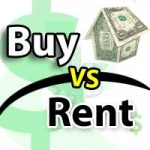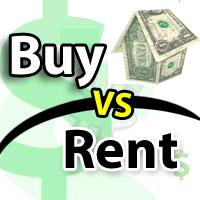 Are you trying to figure out whether it’s better to buy or rent a home in New Jersey? A recently published “rental ratio” for North-Central New Jersey shows the relationship between housing prices and rents that’s informative. The rental ratio is the price of a home divided by theannual cost of renting a similar home. For example, if the price of a home is $200,000 and the annual rental for a similar home is $10,000, the rental ratio would be 20 ($200,000 ÷ $10,000 = 20). The higher the price of the home and/or the lower the rent, the more financially attractive renting will be, and vice versa. In otherwords, the higher the ratio, the more expensive ownership is compared to renting. Many believe that a rental ratio above 20 indicates that serious consideration should be given to renting.
Are you trying to figure out whether it’s better to buy or rent a home in New Jersey? A recently published “rental ratio” for North-Central New Jersey shows the relationship between housing prices and rents that’s informative. The rental ratio is the price of a home divided by theannual cost of renting a similar home. For example, if the price of a home is $200,000 and the annual rental for a similar home is $10,000, the rental ratio would be 20 ($200,000 ÷ $10,000 = 20). The higher the price of the home and/or the lower the rent, the more financially attractive renting will be, and vice versa. In otherwords, the higher the ratio, the more expensive ownership is compared to renting. Many believe that a rental ratio above 20 indicates that serious consideration should be given to renting.
A recent report by Moody’s Economy.com pegs the rental ratio in North-Central New Jersey at 23.4 in the last quarter of 2009. That ratio, down from 27.8 in 2005, suggests that from a financial viewpoint now is agood time to rent rather than buy.
But there may be a better reason to rent than to buy: affordability. The rental ratio only shows the relationship between housing prices and rents. It doesn’t answer the more important question of whether you can afford to buy.
As millions have learned the hard way in the current foreclosure flood, overspending on housing can have heartbreaking consequences.
The costs of home ownership generally substantially exceed the costs of renting, so you should carefully compare both options by figuring the monthly out-of-pocket costs for each. For renters, the cost is simply the amount of monthly rent and possibly utility costs. For prospective homeowners, figuring whether the costs of home ownership fit within the monthly budget is more complicated.
First, there’s the amount that you have to pay themortgage lender. An affordability measure for many mortgage lenders is that your monthly mortgage payment, including interest, principal, real estate taxes and homeowner’s insurance, should not exceed 28 percent of your gross monthly income.
But in making your calculation for comparison to renting, you should take more than the monthly mortgage payment into account. You should include the sum of other annual costs of home ownership, divided by twelve.
These other costs include heating and cooling, groundsupkeep, replacement of appliances and repairs. To get an accurate picture, costs taken into account also should include a ratable share of the estimated amount for the inevitable inside and outside painting and roof replacement. Other costs that warrant inclusion are the income lost by cashing ininvestments to make a down payment and the real estate agent’s commission and closing costs.
To be more accurate, home ownership costs should be reduced by subtracting the tax benefits of interest and real estate tax deductions and the equity buildup from paying down the mortgage.
For condo purchasers, costs would be adjusted by not including amounts for items paid for by the condo association but adding monthly condo fees and assessments.
To help with the arithmetic, there are online calculators that are useful in determining affordability. For example, the Federal Housing Administration’s web site at fha.gov, under the Resources tab, will lead you to a useful Buy Versus Rent Calculator. Other online calculators help present a more complete monthly budget picture by taking additional monthly obligations into account, such as credit card and car payments.
Gerald J. Robinson, Esq., formerly tax counsel to the New York City law firm of Carb, Luria, Cook & Kufeld, is a member of the New York and Maryland bars. He received his B.A. degree from Cornell University, an LL.B. from the University of Maryland and an LL.M. in Taxation from New York University. Prior to entering private practice he served in the Office of Chief Counsel, Internal Revenue Service. He is the author of the treatise, Federal Income Taxation of Real Estate, now in its sixth edition, and wrote the monthly newsletter, Real Estate Tax Ideas, both published by Warren, Gorham & Lamont. He is also a frequent lecturer and contributor to various professional journals. newjerseynewsroom.


In Lakewood rentals are in high demand therfore high in price.
Don’t forget if you rent you can be thrown out by your landlord at any given time. Like if he sells the property or wants it for his children etc. And that could happen at very inconvenient times like right after a baby or at the same time as a childs wedding etc. So keep in mind there are other benefits to owning as opposed to rentin’
How can the landlord throw you out at any time if you have a lease?
if you buy a house, all the investment in it is lost when Mashiach comes & Klal yisroel goes to eretz Yisroel B’karov. BUT if a person knows & believes Mashiach will be here soon then he waits until he makes Aliya before buying a house even if mashiach is not here yet
MAY MASHIACH BE HERE VERY SOON
Most leases go month to month after the initial lease expires. And 30 days notice is all it takes. Unless you can get someone to give you a 10 year lease… Good luck with that. Most landlords want to keep their options open to raise the rent according to the market and be able to sell the prop if a good offer comes, and will not sign such mong leases they don’t want to be stuck.